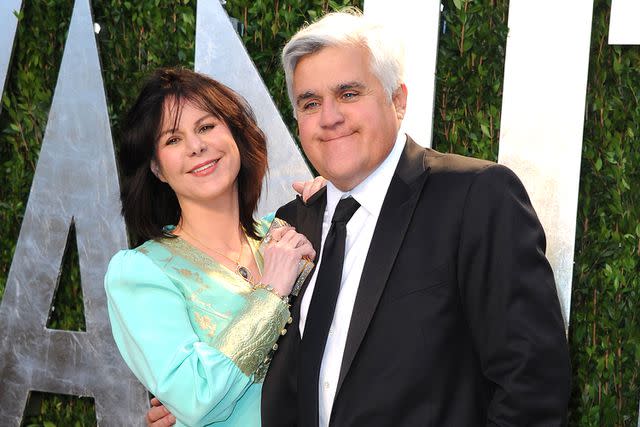Inside Jay Leno's Request to Become Wife's Conservator — and What Legal Experts Say Could Come Next
Two legal experts break down the former 'Tonight Show' host's conservatorship filing process exclusively for PEOPLE

Barry King/FilmMagic
(L-R) Jay Leno and wife Mavis Leno are pictured attending an HBO premiere of an exclusive presentation of 'Billy Crystal 700 Sundays' on April 17, 2014 at Ray Kurtzman Theater in Los Angeles, California.Jay Leno's legal journey for conservatorship over his wife Mavis is dependent on a few factors.
According to documents obtained by PEOPLE, the former Tonight Show host, 73, submitted the conservatorship filing on Friday following her dementia diagnosis. He initiated the filing to set up a living trust for Mavis, 77, to ensure that she has "managed assets" to provide her with future care if he died.
Leno stated in the legal documents that his wife of more than four decades isn't contesting the establishment of a conservatorship, nor does she prefer another person to act as her conservator. The comedian is also requesting that Mavis not attend the related court hearing as it would be "detrimental to her mental and physical health."
Related: Who Is Jay Leno's Wife? All About Mavis Leno
Breaking down this process and what's to come, California probate attorney David A. Esquibias tells PEOPLE: "Jay is asking the court for permission, otherwise known as 'Substituted Judgment,' to create an estate plan (i.e., likely a trust) for his wife because she did not create one on her own prior to [the] onset of her dementia."
"If the court approves Jay's request, he likely will name himself as her beneficiary due to their 40-plus-year marriage," Esquibias continues. "If the Judge does not grant Jay’s request, then upon his wife's death, a probate proceeding will be triggered to determine who receives her share of their assets, which is likely to cost the Leno family hundreds of thousands of dollars in unnecessary legal fees."

Jon Kopaloff/FilmMagic
(L-R) Jay Leno and wife Mavis Leno are pictured attending the 2012 Vanity Fair Oscar Party at Sunset Tower on February 26, 2012 in West Hollywood, California.If the petition is granted, David DuFault — a principal attorney at Sodoma Law — tells PEOPLE that Leno "will be responsible for making all decisions based on the scope that the court gives him."
"Generally, courts like to be as least restrictive as possible," he explains. "I would guess that given her age, given the idea that there is or appears to be a dementia diagnosis, it could be a very broadly-crafted order that says that the petitioner has authority to make all kinds of decisions for her, which could be dealing with financial assets, selling real property, making decisions about beneficiary designations."
Never miss a story — sign up for PEOPLE's free daily newsletter to stay up-to-date on the best of what PEOPLE has to offer, from juicy celebrity news to compelling human interest stories.
DuFault, however, notes that "there can be scrutiny by the court because usually, there is an ongoing obligation to disclose what has happened."
As for the timeline of conservatorship's approval or denial, DuFault says it "depends."
"If it's contested, it could take a while," he explains. "If there's not a lot of dispute, if the evidence is there, that she is maybe slipping or is losing some of the capacity, and it's not being challenged, it probably could happen pretty quickly."
For more People news, make sure to sign up for our newsletter!
Read the original article on People.


